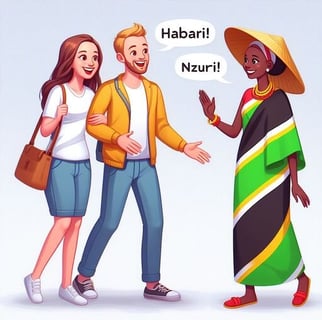Meet and Greet People in Swahili
Greetings in Swahili have more meaning than just asking how others are doing....
Xavery Mpombo
4/30/20243 min read


How to Meet and Greet People in Swahili!
Habari!
It's what you're likely to hear when you meet a Swahili speaker. "Habari" literally means "news," like the kind you watch every day on TV. However, when used as a greeting, it can be translated as "hello, how are you?" or simply "how are you?"
For example:
I watch "habari" on TV every day. It’s used to mean "news."
"Habari," John! It’s used to ask John how he's doing.


Swahili speakers use different greetings depending on their relationship, which you'll learn about on this website. However, "habari" is the most neutral one. It can be used for anyone, regardless of age, familiarity, or time of day.
"Habari" requires a response since, like most Swahili greetings, it's posed as a question seeking an answer. An exclamation mark (!) is added when written instead of a question mark (?). However, some people use a question mark or choose no punctuation mark.
When someone greets you with "habari!", you can respond with either "salama" (literally meaning "safe"), "nzuri" (literally meaning "good" or "beautiful"), or "safi" (literally meaning "clean"). These words translate as "good" or "fine" in response to a greeting.
Them: Habari!
You: Salama, habari!
Them: Salama!


Want to specify your greetings? It’s easy!
You can inquire about "something" or "somebody's" well-being by adding their name after "habari za". The "za" after "habari", which means "of", connects "habari" and the subject.
For example:
Habari za ____! = How is/are ____?


Ask about a place, like Tanzania, Marekani (USA), London, nyumbani (home), hapa (here), people, such as watoto (children), familia (family), or time of day, like asubuhi (morning), mchana (afternoon), jioni (evening), or usiku (night), etc.
For example:
Habari za Tanzania! = How is [everything going in] Tanzania?
Habari za watoto! = How are [your] children?
Habari za asubuhi! = How is [your] morning?


Whatever follows "habari za", the answer is "salama", "nzuri", or "safi". In a comprehensive lesson covering Swahili greetings, you’ll learn all the ways Swahili people greet each other.
Prefer casual greetings?
For your Swahili-speaking friends, opt for more casual greetings. Try "mambo?" (literally meaning "things"), "vipi?" (literally meaning "how?"), or "mambo vipi?" (literally meaning "how are things?"). There are a few more informal greetings, but these three are a good starting point. Since they're casual, use them with friends, peers, or young children – they sound "cute" to children.
Responses to "mambo?", "vipi?", and "mambo vipi?" are "poa" (literally meaning "cool"), "freshi" (literally meaning "fresh"), or "shwari" (literally meaning "calm"), with "poa" being the most common.
Now, confidently greet your friends and anyone who speaks Swahili. And remember, when greeted, don't just reply and leave. Kindly respond and greet back with "habari" or "mambo" to show you care about their well-being.
For example:
Them: Habari!
You: Salama, habari!
Them: Salama!
Or
Them: Mambo vipi?
You: Poa! Mambo vipi?
Them: Freshi!

